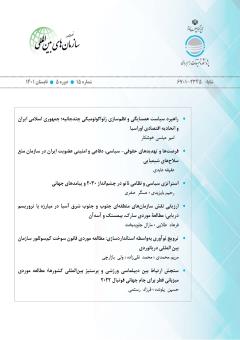فرصتها و تهدیدهای حقوقی- سیاسی، دفاعی و امنیتی عضویت ایران در سازمان منع سلاحهای شیمیایی
محورهای موضوعی : اقدامات و سیاستهای سازمانها
1 - دانشجوی دکتری علوم سیاسی، دانشگاه شاهد، تهران، ایران
کلید واژه: ایران, فرصت, تهدید, کنوانسیون منع سلاحهای شیمیایی (CWC), سازمان بینالمللی منع سلاحهای شیمیایی (OPCW),
چکیده مقاله :
با توجه به گسترش فناوریهای سلاحهای کشتارجمعی و عدم عضویت دشمن منطقهای ایران یعنی اسرائیل در سازمان و بهرغم شاخصهای ذکرشده برای موفقیت کنوانسیون منع سلاحهای شیمیایی(CWC) و سازمان بینالمللی منع سلاحهای شیمیایی (OPCW)، همواره این نگرانی درباره عضویت ایران در OPCW مطرح است که ایران با عضویت در سازمان منع سلاحهای شیمیایی نهتنها بازدارندگی تسلیحاتی خود را از دست دهد، بلکه با ارائه اطلاعات و آمار محرمانه به این سازمان در معرض تهدید اطلاعاتی قرار گیرد. پرسش اصلی پژوهش حاضر این بوده است که ایران با عضویت در کنوانسیون منع سلاحهای شیمیایی (CWC) و سازمان بینالمللی منع سلاحهای شیمیایی از چه فرصتهای حقوقی- سیاسی، دفاعی و امنیتی برخوردار و در عین حال با چه تهدیدهایی مواجه خواهد بود. هدف این تحقیق تبیین دقیق این فرصتها و تهدیدها برای بهرهمندی بیشتر از آنها برای تأمین منافع ایران است. یافتههای پژوهش نشان داده است که تهدیدهای ضمنی عضویت در کنوانسیون و سازمان منع سلاحهای شیمیایی، بدون عضویت نیز برقرار است، اما فرصتهای مستقیم و ضمنی عضویت ایران در این کنوانسیون و سازمان غیرقابل چشمپوشی است.
Due to the proliferation of technologies underlying weapons of mass destruction and the non-membership of Iran's regional rival, Israel, in the organization, and despite the indicators for the success of the Chemical Weapons Convention (CWC) and the Organization for the Prohibition of Chemical Weapons (OPCW), there are always concerns about the consequences of Iran’s membership in the OPCW, meaning that by joining the organization, Iran will not only lose its weapons-based deterrence, but also is exposed to intelligence threats by providing the organization with confidential onformation. The main question of the present study is what legal-political, defense and security opportunities Iran will enjoy and what threats it will face by joining the CWC and the OPCW. The purpose of this research is to accurately explain the opportunities and threats in order to benefit more from them to secure Iran's interests. The findings show that the implicit threats of membership in the CWC and the OPCW are also present in the case of non-membership. However, the direct and implicit opportunities for Iran's membership in the convention and the organization are unavoidable.
بلوچی، حیدرعلی (١٣٨٥). مزایا و معایب عضویت جمهوری اسلامی ایران در معاهدات بینالمللی سلاحهای کشتارجمعی. سیاست خارجی (80)، ٧١٨-٦٩١.
بیگزاده، ابراهیم (١٣٩٠). سازمانهای بینالمللی. تهران: دانشگاه شهید بهشتی.
پرتوی، اصغر. مطلبی، مسعود. موسوی، سیدمحمدرضا (١٣٩٥). بررسی رژیمهای بینالمللی منع کاربرد سلاحهای کشتارجمعی. مطالعات بینالمللی پلیس، ۶ (۲۸)، ٣١-٩.
ساعد، نادر (١٣٨٩). حق بر صلح عادلانه. تهران: نشر مجمع جهانی صلح اسلامی.
شاکریان، شاهرخ (١٣٩٢). مسئولیت بینالمللی سازمان منع سلاحهای شیمیایی درباره همکاریهای صلحآمیز. سازمانهای بینالمللی، ۱ (۲)، ٥٠-٢٥.
ضیایی بیگدلی، محمدرضا (١٣٨٥). حقوق معاهدات بینالمللی. تهران: گنج دانش.
عبداله خانی، علی (١٣٨٣). نظریههای امنیت (ج اول). تهران: ابرار معاصر.
عسگرخانی، ابومحمد (١٣٨٨). رژیمهای بینالمللی. تهران: مؤسسه ابرار معاصر.
مشیرزاده، حمیرا (١٣٨٨). تحول در نظریههای روابط بینالملل. تهران: نشر سمت.
میرزایی، احمد (١٣٨٦). کنوانسیون منع توسعه، تولید، انباشت و بهکارگیری سلاحهای شیمیایی و انهدام آنها. تهران: انتشارات دانشگاه صنعتی مالک اشتر.
نذیری اصل، محسن (١٣٩٢). مسئولیت سازمان منع سلاحهای شیمیایی در قبال نقض امور محرمانه از سوی كاركنان دبیرخانه. سازمانهای بینالمللی، ۱ (۳)، ١١٩-٨٣.
Asgarkhani, A. (2003). Iran and 9/11. Bitter Lemons International, Edition 10 Volume 1 - September 11.
Claude, I. (1971). Swprds into Plowshares: The Problems and Progress of International Organization(4thed). New York: Random House.
Downs, G. W. (1994). Collective Security Beyond the Cold War. Michigan: University of Michigan Press.
Morgenthau, H. (1966). Politics among Nations. New York: Alfred A. Knopf.
Nicholson, J. (1993). Security Dilemma, Offense Defense Distinction. New York: Alfreda.
(20 April 2021). OPCW Director-General Meets with Iran’s Deputy Foreign Minister for Legal and International Affairs. The Hague: https://www.opcw.org/.
Sherwin, C. W. (1956). Securing Peace Through Military Technology. Bulletin of the Atomic Scientists, May.
(2020/07). Statement by the Delegation of the Islamic Republic of Iran. The Hague: https://www.opcw.org/.
(2021/03). Statement by the Delegation of the Islamic Republic of Iran at the 96th Session of the Executive Council on the Draft Decision. The Hague: https://www.opcw.org/.
Tarr, D. W. (1991). Nuclear Deterrence and International Security. New York: Longman Publishing Group.
Thakur, T. C. (2006). The Chemical Weapons Convention: Implementation, Challenges and Opportunities. United Nations University.
Waltz, K. (1979). Theory of International Politics. Toronto: Mc Grow-Hill.


